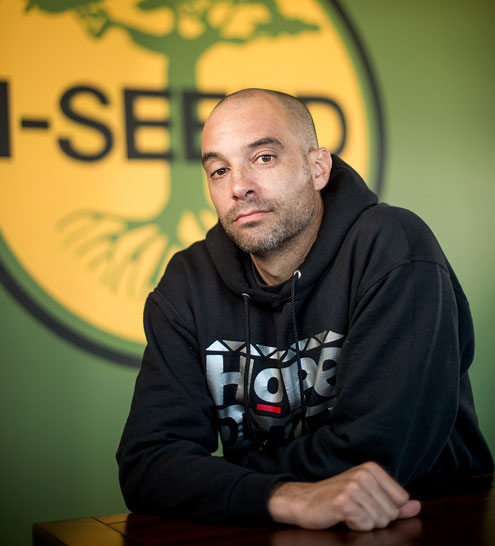
This fall, Jeff Duncan-Andrade, associate professor of Latina/Latino studies and educational leadership, will work with teachers and staff at the Roses in Concrete Community School in East Oakland. Taking its names from a Tupac Shakur poem, which admires roses growing in harsh conditions, ''damaged petals'' and all, the K-8 school is based on a model of education that the professor has pioneered.
You've taught in Oakland public schools for more than two decades. What's your teaching philosophy?
I know my students want to succeed. I don't need to fix them; I need to respond to their needs. If they are hungry, feel unsafe or hate themselves, it is biologically impossible for them to succeed in school.
How will the school address those issues?
Every adult on our campus will make sure that kids have food, water, clothing, shelter and safety. Students will also have the same teacher over multiple years, which means they will develop stronger relationships.
Why make the school a teaching lab?
It's one thing to read about effective teaching, but it's a very different thing to see it live and engage in a conversation with the practitioner. Every teacher will have apprentices from local undergraduate institutions who will train for years to become teachers in the Oakland Unified School District.
The curriculum will incorporate ethnic studies -- why?
You must first understand who you are and who you come from to be able to connect to the experiences, achievements and struggles of others.
In high school, a teacher told you UC Berkeley was out of your league. How did that shape you?
I took his words as a challenge, but I went to Berkeley with doubts. A professor intervened and made me feel differently about myself. That was a really interesting juxtaposition: Both men had the same capacity to impact my life, and they chose to impact it very differently. Those experiences made me want to become the teacher I never had in high school.
Which student has stuck with you the most?
The first student to walk into my class 22 years ago. We had a falling out and he called me after we hadn't spoken for seven years to say, ''I always heard you. I wasn't always in a position to listen, but I always heard you.'' We're still very close. Yesterday he said that he wants to send his daughter to our school.
How has your family influenced you?
My father struggled with his health for major portions of my childhood. Watching him and my mother manage that, with seven kids, I learned that I don't have any right to complain.
What is the most personally meaningful aspect of this project?
My sons will be in school with the sons and daughters of the kids I taught. This will be a community: healthy, safe, a place where people can bring their problems and get resources. We're not trying to build a house; we're trying to build a home.
What advice would you give your high-school self?
To believe in myself. So much of what I learned in high school was to doubt. And I would also encourage myself to dream. I always felt like I was truncating my dreams because people told me, ''You can’t do that.''
Advice for teachers?
Anytime you get stuck, ask yourself what you would do if you were dealing with your own child -- and do that. Kids don't need you to be perfect or have all the answers. They just want to know that you care.
Photo by NOAH BERGER